Introduction: The Enigma of Enoch
In ancient religious texts, one name stands out among the figures of antiquity—Enoch, the great-grandfather of Noah. Known for his mysterious disappearance, Enoch has been the subject of religious, historical, and esoteric speculation for centuries. What sets Enoch apart from other biblical figures is his apparent immortality, which has led to widespread fascination and intrigue. The Bible tells us that Enoch “walked with God” and then “was not, for God took him” (Genesis 5:24). This cryptic passage has inspired countless interpretations, but what is the true significance of Enoch’s immortality? Did he truly escape death, or was his longevity a symbolic reflection of a greater spiritual truth?
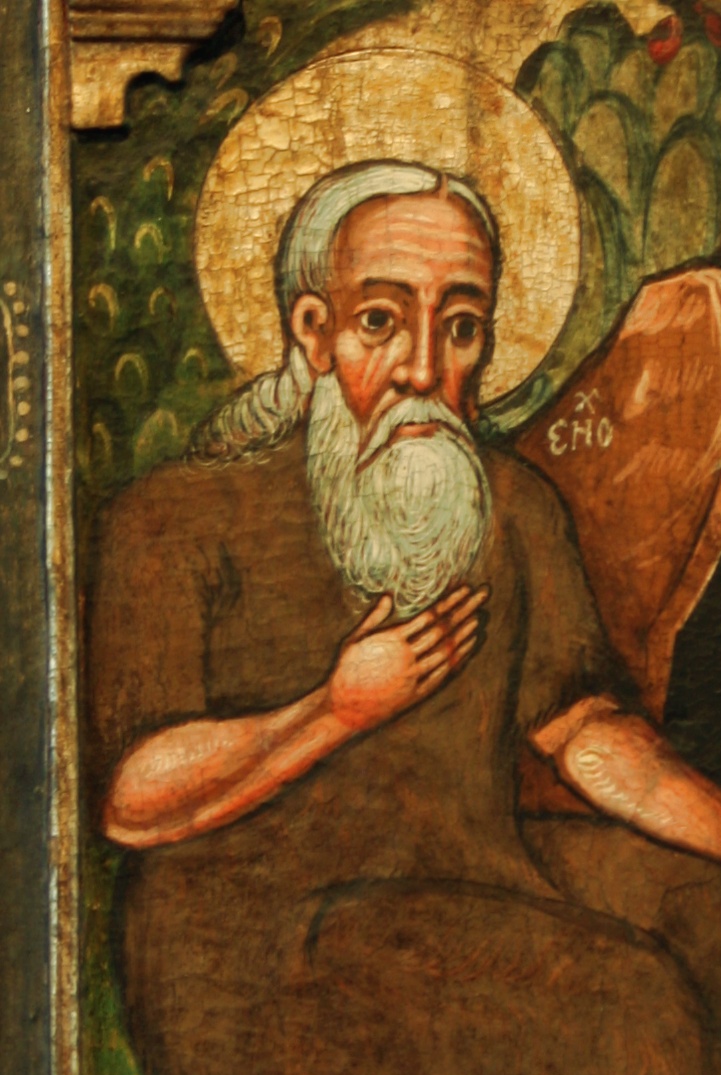
This article explores the story of Enoch, delving into his mysterious role in religious history, the possible meanings behind his immortality, and the secrets he may hold for understanding human longevity. By investigating the biblical account, historical interpretations, and modern scientific inquiry, we aim to uncover the deeper meaning behind the figure of Enoch and the mystery of his supposed eternal life.
The Biblical Account of Enoch: A Man Who Walked with God
The primary source for the story of Enoch comes from the Book of Genesis. According to the genealogy in Genesis 5:21-24, Enoch was born to Jared, and he lived for 365 years. Unlike other patriarchs mentioned in the Bible, who are described as having fathered children and then dying at an advanced age, Enoch’s story takes a different turn. The verse simply states that “Enoch walked with God: and he was not; for God took him.”

The phrase “walked with God” is rich in theological and symbolic meaning. It suggests a unique and intimate relationship with the divine, implying that Enoch was not only a righteous man but one whose life was profoundly aligned with the will of God. The text also notes that Enoch did not experience death in the conventional sense; instead, he was “taken” by God, sparking speculation about his fate. His sudden departure, with no mention of death, left an indelible impression on subsequent generations of religious thinkers and inspired many to ponder the possibility of human immortality.
The Significance of Enoch’s Longevity in the Bible
Enoch’s exceptional lifespan of 365 years is worth noting in itself. In biblical times, lifespans were significantly longer than those typically experienced in modern times, but even by these standards, Enoch’s age stands out. His short life relative to others like Adam, who lived for 930 years, adds to the uniqueness of his story. In contrast to the typical biblical narrative of longevity, Enoch’s life appears as an anomaly—a life not concluded by death, but by divine intervention.
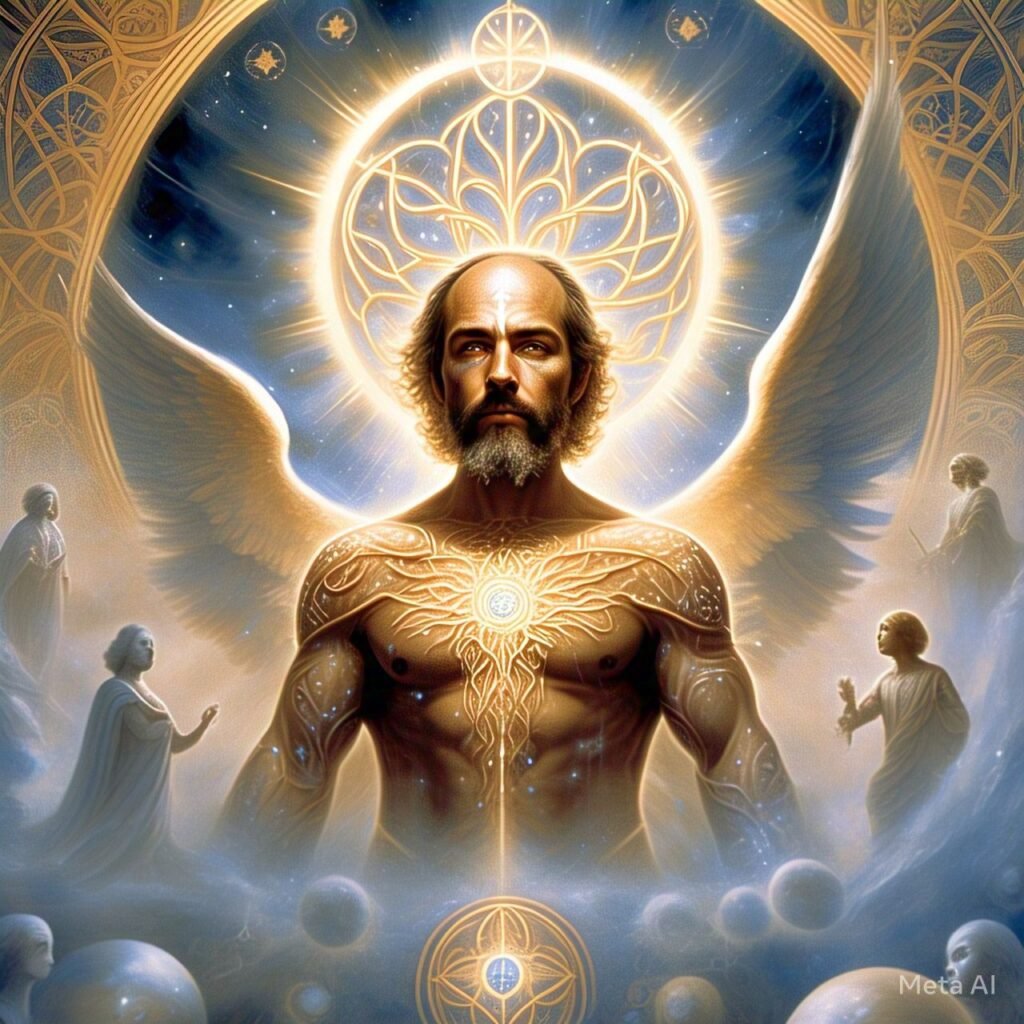
The number 365 is particularly symbolic. Some interpretations suggest that it could be a reference to the solar year, with each day corresponding to a year of Enoch’s life. This association hints at a cosmic or divine order linking his life to the natural rhythms of the world. Furthermore, the idea that Enoch “walked with God” could be interpreted as a form of spiritual alignment that transcends the ordinary human experience, suggesting that his life was a divine plan rather than a natural occurrence.
The Apocryphal and Esoteric Traditions: Enoch as the First Immortal
While the Bible offers only a brief mention of Enoch, the apocryphal and esoteric traditions provide a much more detailed and enigmatic account of his life. The Book of Enoch, an ancient Jewish text that was excluded from the canonical Bible, offers an expanded version of his story. This work describes Enoch’s role as a mediator between God and the fallen angels (the Watchers), who had descended to Earth and corrupted humanity. Enoch is depicted as a righteous man who communicates directly with divine beings and acts as a scribe recording the divine secrets.
In these traditions, Enoch is portrayed as a figure of immense wisdom and spiritual insight. He is granted access to heavenly realms and is shown visions of the future, including prophecies concerning the coming judgment of the wicked. The Book of Enoch also suggests that Enoch’s transformation into an immortal being was not merely a divine gift, but the result of his righteous life and deep communion with the divine. His ascent into heaven is described in more detail, with Enoch being taken up into the celestial realms where he is transformed into an angelic being. This ascension underscores the idea that Enoch’s immortality was not an accident but the result of a divine plan.
In the context of the esoteric traditions, Enoch is often equated with the figure of Metatron, a prominent angel in Jewish mysticism. Metatron is described as the “highest of the angels” and the “scribe of God.” This transformation of Enoch into Metatron suggests that his immortality is not simply physical but represents a spiritual elevation that transcends human limitations. By achieving this divine status, Enoch is viewed as a prototype for human beings who seek to transcend the mortal realm through spiritual purity.
The Science of Longevity: Can Humans Achieve Immortality?
The figure of Enoch raises intriguing questions about the possibility of human immortality. While Enoch’s longevity is framed within the context of divine intervention, modern science has increasingly turned its attention to the potential for extending human life. Advances in medical research, biotechnology, and gerontology have led to new insights into the mechanisms of aging and the possibility of life extension.
One promising area of research focuses on the role of telomeres, the protective caps at the ends of chromosomes that shorten with each cell division. Telomere shortening is closely linked to aging, and scientists are exploring ways to slow or reverse this process. Some researchers believe that by targeting the enzymes that control telomere length, it may be possible to extend the lifespan of cells and, by extension, the human body.
Another area of interest is regenerative medicine, which aims to repair or replace damaged tissues and organs. Stem cell therapies, tissue engineering, and gene editing techniques like CRISPR offer the potential to regenerate aging tissues and even reverse some of the effects of aging. If these technologies continue to advance, it could lead to the possibility of significantly extending human lifespan, if not achieving a form of immortality similar to the biblical account of Enoch.
Spiritual Longevity: Enoch’s Immortality as a Metaphor for Transcendence
While modern science grapples with the biological aspects of longevity, Enoch’s immortality can also be understood through a spiritual lens. In many religious and philosophical traditions, the concept of immortality is not necessarily physical but spiritual. Enoch’s ascent into heaven and his transformation into an angelic being can be seen as a metaphor for the soul’s journey toward divine union.
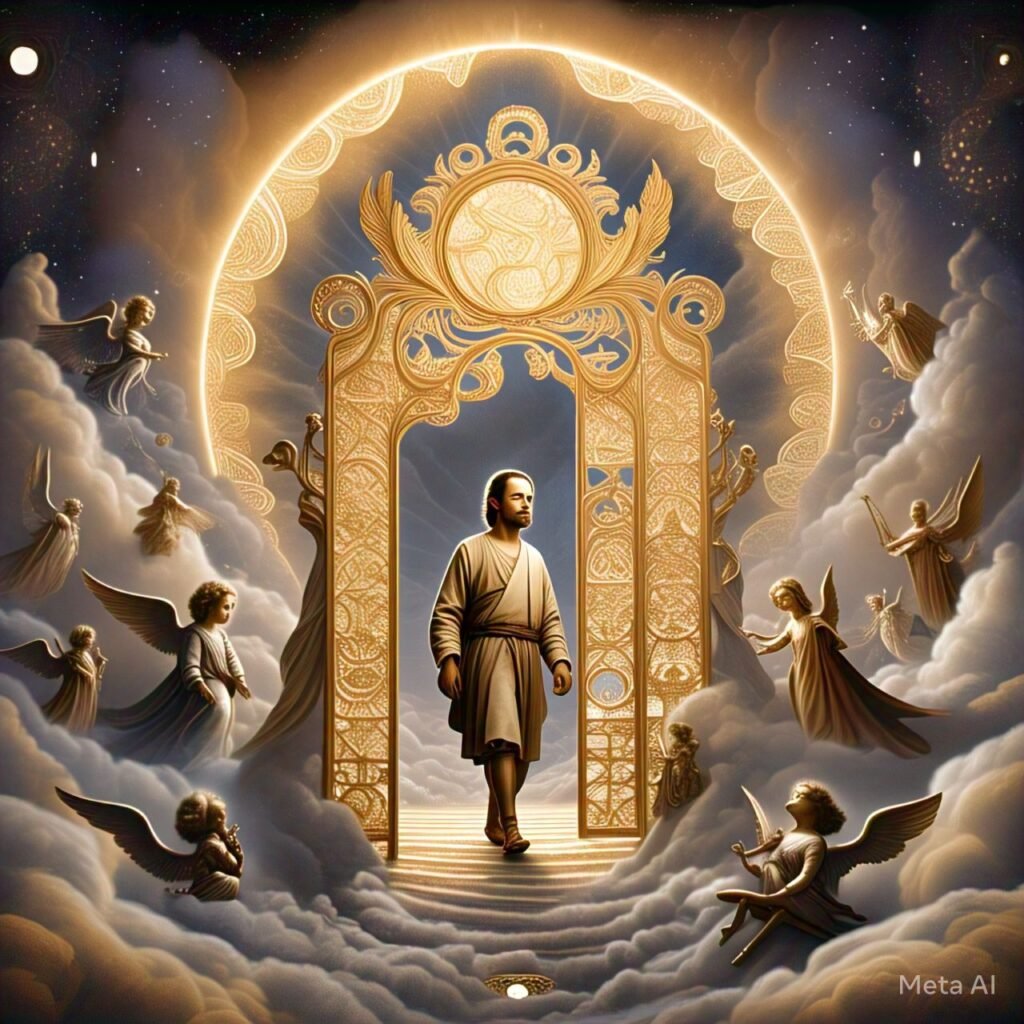
The idea that human beings can achieve a form of spiritual immortality through righteousness and communion with the divine is central to many religious teachings. Enoch’s story embodies this idea, illustrating that true immortality is not about escaping death but about transcending the limitations of the mortal world. In this sense, Enoch’s immortality serves as a powerful symbol of spiritual enlightenment and the potential for humans to reach a higher state of being.
The Legacy of Enoch: Influence on Later Religious and Mystical Thought
Enoch’s influence extends far beyond the biblical texts and apocryphal writings. Throughout history, his story has had a profound impact on various religious and mystical traditions. In Kabbalah, Enoch is closely associated with the concept of the Tree of Life and the mystical path of ascent. His transformation into Metatron is seen as a symbol of spiritual ascension, where the soul sheds its earthly limitations and merges with the divine.
In Christian mysticism, Enoch’s ascension into heaven without experiencing death is often interpreted as a precursor to the resurrection of Christ and the ascension of the faithful. Enoch’s story foreshadows the ultimate triumph of the soul over death, which is a central theme in Christian eschatology. Moreover, in various gnostic traditions, Enoch is regarded as a figure who possessed secret knowledge, much like the gnostic sages who sought hidden wisdom through divine revelation.
Enoch’s name has also been invoked in various philosophical systems, where he is seen as a symbol of the pursuit of divine wisdom and the aspiration to transcend the material world. His life is an example of how one can achieve spiritual immortality by living in harmony with divine principles.
The Role of Enoch in Judaic Mysticism: Enoch as the Bridge Between Heaven and Earth
In Judaic mysticism, Enoch’s role as a spiritual mediator has been a central theme for millennia. His story is woven deeply into the fabric of Kabbalistic teachings, where he is often seen as a symbolic figure of the soul’s journey toward divinity. The ascent of Enoch into the heavens is not only understood as a physical departure but also as a spiritual elevation—a process where the soul sheds its earthly limitations and attains a higher level of existence.
Kabbalah, the Jewish mystical tradition, presents Enoch’s transformation into Metatron as a significant spiritual event. Metatron is not only the highest-ranking angel in the heavenly hierarchy but also the divine scribe who records the actions of humanity and the will of God. In this interpretation, Enoch’s immortality symbolizes the attainment of wisdom and divine insight. His physical life, which was once bound by earthly constraints, transcends into a higher, eternal existence. The concept of Metatron in Kabbalah has given rise to the belief that Enoch serves as a guide for those seeking spiritual elevation. His immortality is seen as an aspirational model for mystical seekers who desire to align themselves with divine will and wisdom.
Enoch and the Watchers: The Fallen Angels and the Corruption of Humanity
The Book of Enoch offers an alternative narrative to the brief biblical account, especially in its detailed descriptions of the Watchers, a group of angels who descended to Earth and engaged in forbidden activities with human women. This intermingling between divine beings and humans is depicted as a catalyst for the corruption of humanity. The fallen angels, known as the Watchers, taught humans various forbidden arts, such as magic, astrology, and the making of weapons. This was seen as a direct violation of divine order, and as a result, the world was corrupted by these teachings.
Enoch’s involvement in this story is crucial. As the righteous mediator between the divine and the corrupt world, he is called upon to intercede on behalf of humanity and the fallen angels. In the Book of Enoch, Enoch acts as a messenger, delivering divine judgments and warnings to the Watchers, who are ultimately condemned for their transgressions. His role as the scribe who records these events signifies his unique relationship with the divine, where he is both a participant in and a witness to celestial affairs.
In this context, Enoch’s immortality can be interpreted as a form of divine favor, allowing him to live beyond the earthly constraints of death and time. His ascent to heaven and his role as Metatron serve as a spiritual contrast to the fate of the fallen angels, who are punished for their misdeeds. Enoch, by contrast, is rewarded for his righteousness, not just with longevity but with eternal existence in the heavenly realms.
Enoch’s Influence on Early Christianity: A Precursor to Christ’s Ascension
Enoch’s narrative has also deeply influenced early Christian thought, particularly in regard to the concept of ascension and resurrection. The early Christian Church recognized the parallel between the ascension of Enoch and the later ascension of Jesus Christ. In both cases, these figures defy death in extraordinary ways, offering a model for the faithful in their own spiritual journeys.
Enoch’s escape from death—ascending into heaven while avoiding physical death altogether—echoes the later Christian doctrine of bodily resurrection and ascension. Many early Christian scholars believed that Enoch’s journey to the heavens was a precursor to Christ’s ascension and the hope of resurrection for all believers.

This connection is particularly significant because, in the Christian worldview, the concept of resurrection is central to salvation and eternal life. Enoch’s immortality, therefore, is seen as a type or foreshadowing of the resurrection, providing a theological foundation for the Christian doctrine of eternal life.
Additionally, Enoch’s role as a righteous man who walks with God parallels the Christian concept of sanctification, the process by which a believer grows closer to God and lives a life that is pleasing to Him. In the Christian tradition, Enoch’s story becomes a symbol of the ideal life—one that strives for holiness, purity, and closeness to the divine. Enoch’s escape from death signifies not just physical salvation but spiritual transcendence, which early Christian thinkers emphasized as the ultimate goal for believers.
Enoch and the Concept of Knowledge: A Figure of Wisdom
In addition to being viewed as a figure of divine ascent, Enoch is also seen as the keeper of divine knowledge. The Book of Enoch, in particular, presents him as a sage who is privy to the secrets of the heavens and the mysteries of the cosmos. This knowledge is not merely intellectual but spiritual in nature. Enoch is shown as receiving divine revelations about the future, the fate of the wicked, and the cosmic order. These revelations were said to have been passed down to future generations as a guide for righteous living.
The knowledge that Enoch receives is said to be directly linked to the divine wisdom that governs the universe. This theme of sacred wisdom is important because it connects Enoch’s immortality to the idea that spiritual enlightenment—gained through direct communion with the divine—can lead to eternal life. In esoteric traditions, knowledge is often seen as the key to transcending mortality, with enlightenment offering liberation from the cycle of life and death. Enoch, as the first immortal, symbolizes the power of divine knowledge to unlock eternal existence.
Moreover, the idea that Enoch was able to write down divine revelations highlights his role as the scribe of God. His writings, known as the “Books of Enoch,” are regarded as important apocryphal texts that contain spiritual and moral teachings meant to guide future generations. These texts were influential in shaping early Jewish thought and later Christian eschatology, underlining the notion that immortality is tied not just to the physical but to the pursuit of divine wisdom and knowledge.
Enoch’s Role in the Quest for Divine Justice
Enoch’s legacy also ties deeply into the theme of divine justice. As the righteous man who stood in contrast to the wickedness that had overtaken the world, Enoch became a figure associated with the ultimate judgment of humanity. In the Book of Enoch, his role as a mediator between God and humanity is underscored by his active participation in the judgment of the fallen angels and the corrupt human world. He delivers God’s judgment on the wicked, ensuring that justice is served.
This aspect of Enoch’s story speaks to the broader religious idea that immortality and righteousness are inseparable. In the eyes of the divine, those who walk in righteousness and serve as instruments of divine justice are granted eternal life. Enoch’s immortality, therefore, is not just a personal blessing; it also serves as a symbol of the divine judgment and order that will ultimately prevail over evil. His example suggests that those who seek to uphold divine justice and purity may be rewarded with eternal life, not just in a spiritual sense but in a literal, ongoing existence that transcends time.
In many religious traditions, the notion of eternal life is deeply intertwined with moral behavior. The righteous are rewarded with immortality, while the wicked face destruction or punishment. Enoch’s survival and ascension into the heavens act as a reminder that immortality is not guaranteed to all but is reserved for those who align themselves with divine will and engage in the pursuit of justice, wisdom, and holiness.
The Mystery of Enoch’s Immortality: Beyond Biological Limits
Although Enoch’s story has been explored from a spiritual and theological perspective for centuries, it also raises important questions about the limits of human biology and the potential for transcending the natural aging process. The idea that Enoch was taken by God without experiencing death challenges our modern understanding of biology and the inevitability of aging and death. In a world where scientific research increasingly focuses on extending human lifespan, the concept of immortality—whether biological or spiritual—has gained new relevance.
While scientific advancements in areas such as genetic engineering, stem cell research, and regenerative medicine may offer the possibility of extending life or even reversing aging, Enoch’s immortality challenges the very idea of human limitations. His escape from death, being neither an act of scientific achievement nor a natural biological process, invites contemplation on the nature of existence itself.
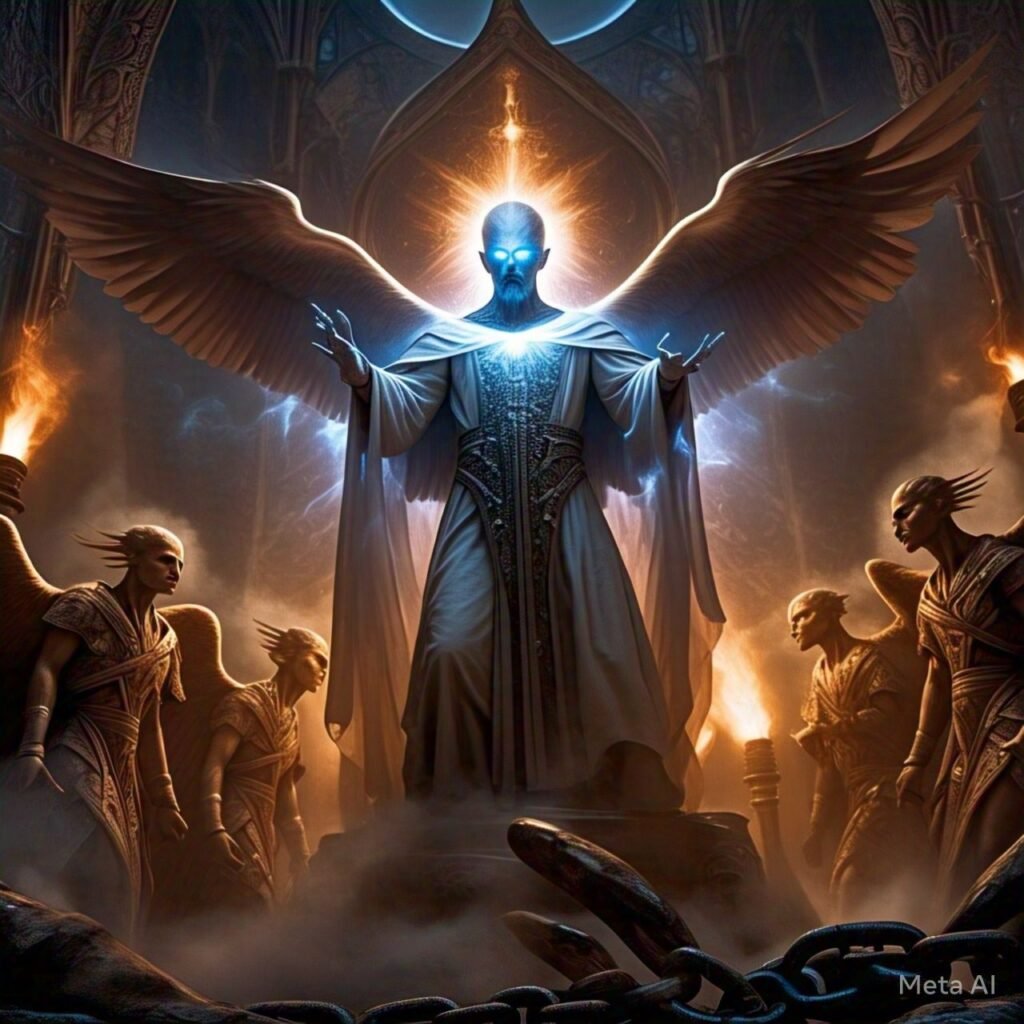
Could it be that there are other realms or dimensions beyond the physical world that hold the key to immortality? Or, as some religious interpretations suggest, does immortality arise not from the physical body but from a higher, spiritual realm, where the soul is freed from the constraints of the material world?
Enoch’s life serves as a metaphor for the yearning to transcend human frailty and to experience a form of existence that is beyond time, aging, and decay. While modern science continues to explore the biological underpinnings of aging, Enoch’s immortal status suggests that there may be aspects of human existence—spiritual or otherwise—that are not bound by the laws of nature.
Enoch in the Context of Other Ancient Myths: The Universality of Immortality
The story of Enoch, particularly his ascension to the heavens and his immortality, shares striking similarities with other ancient myths and religious traditions around the world. Immortality, whether through divine intervention or a spiritual journey, is a theme found across cultures, suggesting a universal human longing for eternal life or transcendence.
In Mesopotamian mythology, the Epic of Gilgamesh presents a similar exploration of immortality. Gilgamesh, the king of Uruk, embarks on a journey seeking the secret to eternal life after the death of his close companion, Enkidu. Though he ultimately fails in his quest, the story reveals a deep-seated desire for humans to escape the finality of death. Similarly, in Greek mythology, figures such as Heracles (Hercules) and Persephone have elements of immortality or transcendence in their stories, either through divine favor or transformation into gods.
What makes Enoch’s story stand out in this context is that he represents the only biblical figure who, unlike others who die and are resurrected or ascend through spiritual purification, bypasses death entirely and is taken directly into the presence of God. This makes his narrative particularly unique in ancient religious traditions, marking a profound spiritual ideal: the possibility of achieving eternal life not through human effort alone, but through divine grace and favor.
Additionally, the figure of Enoch’s transformation into Metatron aligns with the broader concept of ascension into a higher state of being seen in other cultures. In Egyptian mythology, for example, Osiris, once a mortal king, is transformed into a god of the afterlife, presiding over the realm of the dead. The ascension of Enoch into Metatron can thus be viewed as another cultural expression of a human being transcending the limitations of mortality and becoming something divine.
Enoch as the Precursor to Spiritual Enlightenment and Ascension
Enoch’s immortality is not only significant from a theological perspective but also within the framework of spiritual enlightenment. The idea of ascension—rising above the mundane world and becoming one with the divine—was central to many mystic traditions, including Gnosticism, Sufism, and Eastern philosophies. In these traditions, the ascent of the soul is the ultimate goal, symbolizing the journey from ignorance to enlightenment, from mortality to immortality.
In Gnosticism, for example, spiritual enlightenment and the direct knowledge of God were believed to be the means by which the soul could transcend the material world and return to its divine origin. Similarly, in Sufism, the concept of ascension is central, as practitioners believe that through mystical practices and divine knowledge, they can become one with the Divine Presence. In this context, Enoch’s ascension can be seen as an archetype of the soul’s journey toward enlightenment and divine union.
The image of Enoch walking with God is often interpreted as a metaphor for the spiritual journey, where one’s entire life is dedicated to achieving a deeper, more intimate relationship with the divine. His transformation into Metatron is symbolic of the ultimate goal of the spiritual seeker: to shed the limitations of the human form and reach a state of purity and closeness with God. Enoch’s immortality, in this light, becomes a symbol of the transformative power of spiritual enlightenment—where death is not an end, but a transition to a higher state of being.
Enoch and the Concept of the Divine Covenant
In the biblical tradition, Enoch’s story can be viewed as part of the larger narrative of the divine covenant between God and humanity. The covenants made with figures such as Noah, Abraham, and Moses are central to the Abrahamic faiths, each representing a new chapter in the relationship between humanity and the divine. Enoch’s unique position, however, is marked by his personal, unbroken relationship with God. His “walking with God” signifies a closeness that is not seen in other figures, except perhaps Adam before the fall or Noah in his righteousness.
The concept of covenant in biblical theology often involves a reciprocal relationship—humanity is expected to follow God’s commands, and in return, God offers blessings and protection. Enoch, however, seems to transcend this model. His immortality is a sign of divine favor, but it is not contingent upon a covenant or a specific action that benefits the broader human race.

His immortality, then, can be seen as a sign of the potential for humanity to reach a direct and unbroken relationship with God, where divine favor is granted purely based on the individual’s closeness to the divine will.
In a broader spiritual sense, Enoch’s ascension serves as an invitation for humanity to seek a similar intimate relationship with the divine. His story can be understood as an expression of the potential for personal salvation and the possibility of achieving an eternal, unblemished union with God—without the need for death as a transition.
Enoch in the Context of Ancient Prophecies and Revelation
Beyond his role as the first immortal man, Enoch is often regarded as a prophet and a seer in various religious traditions. His writings in the apocryphal Book of Enoch contain many prophecies, particularly regarding the judgment of the wicked and the coming of a messianic figure who will restore justice. These prophecies focus on the divine judgment that will come upon the earth and the ultimate restoration of cosmic order.
The book itself is filled with vivid and often unsettling imagery, depicting the fate of the fallen angels (the Watchers), the punishment of the wicked, and the eventual establishment of a kingdom of righteousness. Enoch’s prophetic role, then, aligns him with figures in other ancient traditions who are called upon to reveal divine secrets. Like the oracles of Delphi in ancient Greece or the prophets of ancient Israel, Enoch functions as a conduit between the divine and the earthly realm, bearing messages that are beyond human understanding.
His prophecies, particularly those found in the “Book of Watchers,” reveal a moral order to the universe in which the wicked will ultimately face judgment, and the righteous will be rewarded. The idea that Enoch was chosen to reveal these truths underscores his role not just as an immortal being, but as one who possesses special insight into the divine workings of the universe. In many ways, his life and his writings represent the intersection of human frailty and divine wisdom, and they offer a vision of the world that transcends the physical and touches on the eternal.
Enoch and the Theological Implications of Pre-existence
A fascinating aspect of Enoch’s immortality is the concept of pre-existence—an idea that suggests Enoch existed before his earthly birth in a divine realm. While this notion is not explicitly stated in the biblical text, various interpretations in mystical and esoteric traditions suggest that Enoch, like other figures who transcend death, may have been a pre-existent soul chosen by God for a specific purpose.
In certain Kabbalistic teachings, it is believed that souls exist in a divine realm before their physical incarnation on Earth. This idea of pre-existence aligns with the notion that Enoch’s immortality was not merely a result of his earthly righteousness, but part of a divine plan that transcended his time on Earth. According to this view, Enoch was chosen before birth to fulfill a unique role in the cosmic drama—his life and immortality serving as part of a larger spiritual purpose.
In this context, Enoch’s life would not be seen as an isolated event, but as part of a divine continuum in which the soul undergoes multiple phases, from pre-existence to physical incarnation and ultimately to spiritual ascension. Enoch’s immortality, then, becomes a manifestation of this divine plan—a living example of how human beings can transcend their earthly nature and achieve a state of eternal existence.
Enoch and the Ancient Symbolism of the Tree of Life
Enoch’s immortality and spiritual ascension also relate to ancient symbols of immortality and divine wisdom, particularly the Tree of Life, which has been a central motif in many world religions and spiritual traditions. The Tree of Life is often viewed as a symbol of eternal life, growth, and enlightenment, and it can be found in the mythologies of numerous ancient cultures. In the biblical tradition, the Tree of Life is present in the Garden of Eden, where Adam and Eve are initially denied access to it after the Fall.
However, in the mystical traditions surrounding Enoch, the Tree of Life takes on a different significance. In Kabbalah, for instance, the Tree of Life is not just a physical tree but a spiritual structure representing the interconnectedness of the divine realms and the path to spiritual ascent.
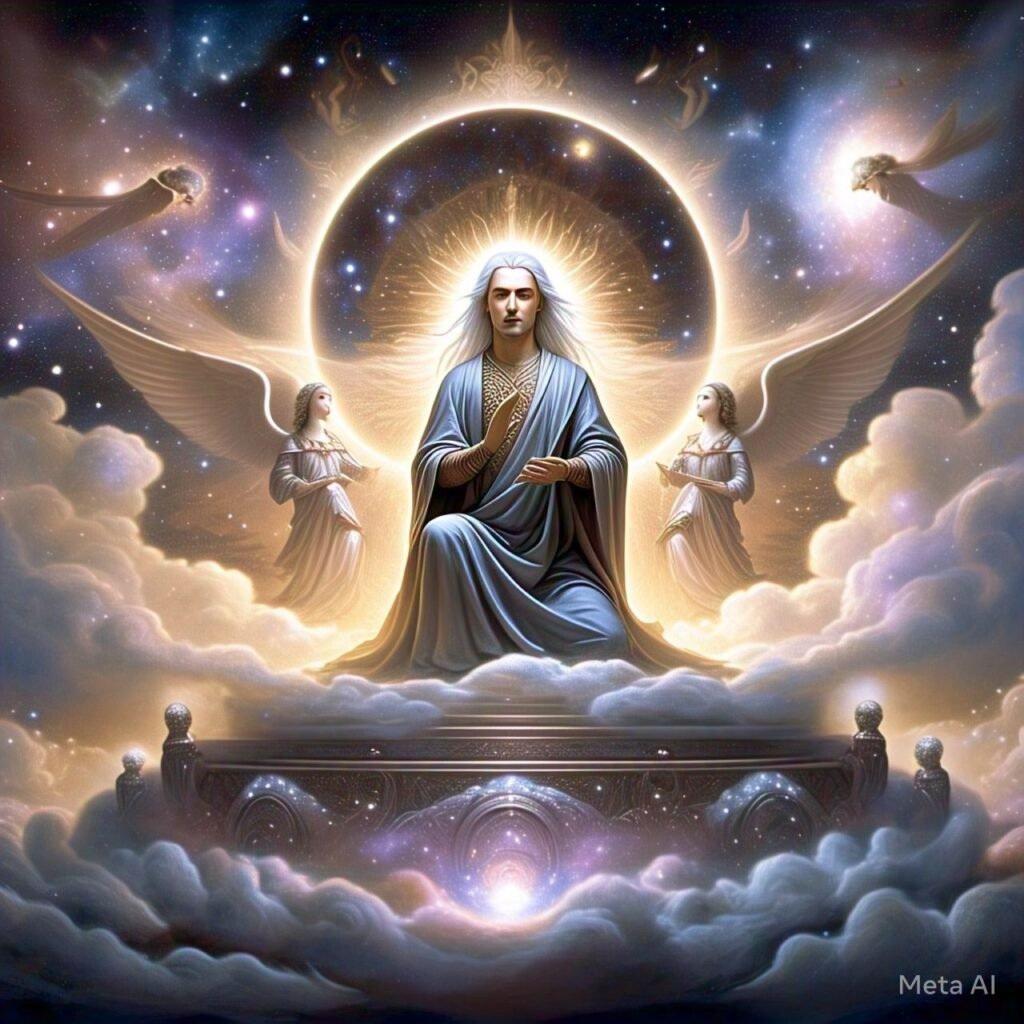
Enoch’s own ascension into the heavenly realms and his transformation into Metatron can be seen as a symbolic manifestation of reaching the “top” of the Tree of Life—attaining the highest state of spiritual enlightenment and communion with God.
Enoch’s immortality, then, could be interpreted as the fruit of this Tree of Life, representing the ultimate spiritual reward for those who pursue divine wisdom and righteousness. In this context, his life and ascension are part of the larger mystical path that leads the soul toward perfection and eternal union with the divine. Just as the Tree of Life symbolizes eternal renewal and the possibility of transcendence, so too does Enoch’s narrative provide a pathway to immortality through divine favor and wisdom.
Enoch and the Spiritual Transformation of the Body
The concept of Enoch’s ascension to heaven without dying also hints at an ancient belief in the possibility of spiritual transformation that transcends the limits of the physical body. In many esoteric and mystical teachings, the physical body is viewed as a temporary vessel for the soul, which is destined to undergo a process of purification and transformation in order to achieve a higher state of being. Enoch’s transition from mortal man to immortal angel is seen as a metaphor for this spiritual evolution.
In some Gnostic traditions, there is the idea that the material world and the physical body are impediments to spiritual progress. The body, with all its desires and attachments, is a temporary shell that holds the soul back from reaching divine enlightenment. The ultimate goal, then, is to shed the physical body in order to transcend material limitations and reunite with the divine. Enoch’s ascension, which occurs without the death of his body, reflects this ideal—he is able to transcend the physical world while still maintaining his human essence, becoming one with the divine without losing his individual identity.
In this sense, Enoch’s immortality is not merely an escape from death, but a transformation into a higher, spiritual form. His physical body is not bound by the laws of nature; rather, it is elevated and purified, becoming a vehicle for eternal spiritual existence. This transformation of the body into a spiritual form has parallels in other traditions as well, such as in Hinduism, where the ultimate goal is Moksha—the liberation of the soul from the cycle of birth, death, and rebirth. Similarly, the concept of spiritual ascension in Sufism involves the purification of the self to the point where the soul transcends the material world and unites with God.
Enoch and the Angelic Hierarchy: A Unique Place in Heaven
One of the most intriguing aspects of Enoch’s immortality is his transformation into Metatron, a position that places him at the very top of the angelic hierarchy. Metatron is often described as the highest of all angels, a divine scribe who records the deeds of humans and serves as an intermediary between God and humanity. This transformation elevates Enoch not only to a position of spiritual eminence but also to a unique role within the heavenly realm, highlighting the significant nature of his immortality.
In various Jewish mystical traditions, Metatron is described as the “Prince of the Divine Presence” or the “Youth of the Throne,” signifying his unparalleled closeness to God. Metatron’s role as a divine scribe places him in a unique position, as he is entrusted with the recording of human actions and the decrees of God. This idea mirrors the ancient concept of the cosmic order, where divine beings are responsible for maintaining the balance of the universe, whether through recording human deeds, dispensing justice, or serving as divine messengers.
Metatron’s elevated status is also linked to the idea that Enoch, through his ascension and immortality, represents the perfected human being who has ascended to the highest spiritual plane. His transformation into an angel signifies the ultimate union of the human and divine. The story of Enoch’s elevation into the heavenly realms challenges conventional views of human limitations, suggesting that, through divine grace, humanity has the potential to achieve a state of spiritual perfection that rivals that of celestial beings.
Enoch’s Role in the Final Judgment: A Judge of Souls
Enoch’s immortality also ties him to the eschatological concept of the final judgment, where the deeds of all human beings will be evaluated, and the righteous will be rewarded while the wicked are punished. The Book of Enoch explicitly portrays Enoch as a key figure in the judgment of both humans and fallen angels. His role as a divine judge—mediating between humanity and God—further solidifies his immortality as a divine honor and a necessary function in the cosmic order.
The Book of Enoch offers vivid descriptions of the final judgment, where the wicked are condemned to punishment and the righteous are rewarded with eternal life. Enoch’s role as a judge and scribe underscores the importance of moral conduct and divine justice.

This association with judgment is significant because it demonstrates that immortality, in Enoch’s case, is not simply about escaping death, but about fulfilling a divine purpose and ensuring that cosmic justice is carried out.
In many traditions, the final judgment is seen as a time when the deeds of all individuals are revealed, and the ultimate fate of the soul is determined. Enoch, as the one who records and executes divine judgments, becomes a symbol of the justice that transcends time and death. His immortality, therefore, is not just a personal reward but a responsibility to uphold the moral order of the universe. His continued existence in the heavenly realm allows him to perform this critical function, ensuring that divine justice is maintained across both the earthly and celestial spheres.
Enoch and the Esoteric Knowledge of the Universe
Enoch’s immortality and his ascension to heaven are also intricately tied to the concept of esoteric knowledge—hidden or secret wisdom that is accessible only to a select few. Throughout history, there has been a belief that certain individuals, through divine grace or mystical practices, have access to hidden truths about the nature of the universe, the soul, and the divine order. In many ancient traditions, these truths were believed to be concealed from the masses, only to be revealed to those who were spiritually advanced or divinely chosen.
Enoch’s writings, especially the apocryphal “Book of Enoch,” are regarded as repositories of this hidden knowledge. The book reveals secrets about the workings of the universe, the fate of the angels, the future of the earth, and the coming judgment. This knowledge was considered too sacred for ordinary people to access and was often passed down through generations of spiritual initiates or divine beings like Enoch himself.
In the broader context of esoteric traditions, the concept of secret knowledge aligns with the idea that immortality is not just a matter of living forever but of gaining access to the divine truths that govern existence. Enoch, as the one who possesses this knowledge, becomes a symbol of the transformative power of wisdom and spiritual understanding. His immortality is, therefore, a reflection of his access to the deepest mysteries of the universe, which he is tasked with recording and sharing with humanity in a way that brings them closer to the divine.
Enoch and the Eschatological Role: The Prophecy of the Messiah
In the Jewish and Christian traditions, Enoch’s story is often intertwined with eschatological themes, particularly the prophecy of the coming Messiah. The Book of Enoch is filled with prophecies that allude to a future divine intervention to restore justice and peace to the world. These prophecies include vivid descriptions of the coming of a “Son of Man,” a messianic figure who will judge the wicked and reward the righteous. While the Messiah is not explicitly identified with Enoch in all traditions, there is a strong thematic connection between Enoch’s role as a prophetic figure and the expectations surrounding the Messiah.
Enoch’s unique position as a prophet, mediator, and ascended being gives him a pivotal role in the unfolding of future events. His immortal status and his ability to receive divine revelations position him as a messenger who delivers the will of God regarding the ultimate fate of humanity.
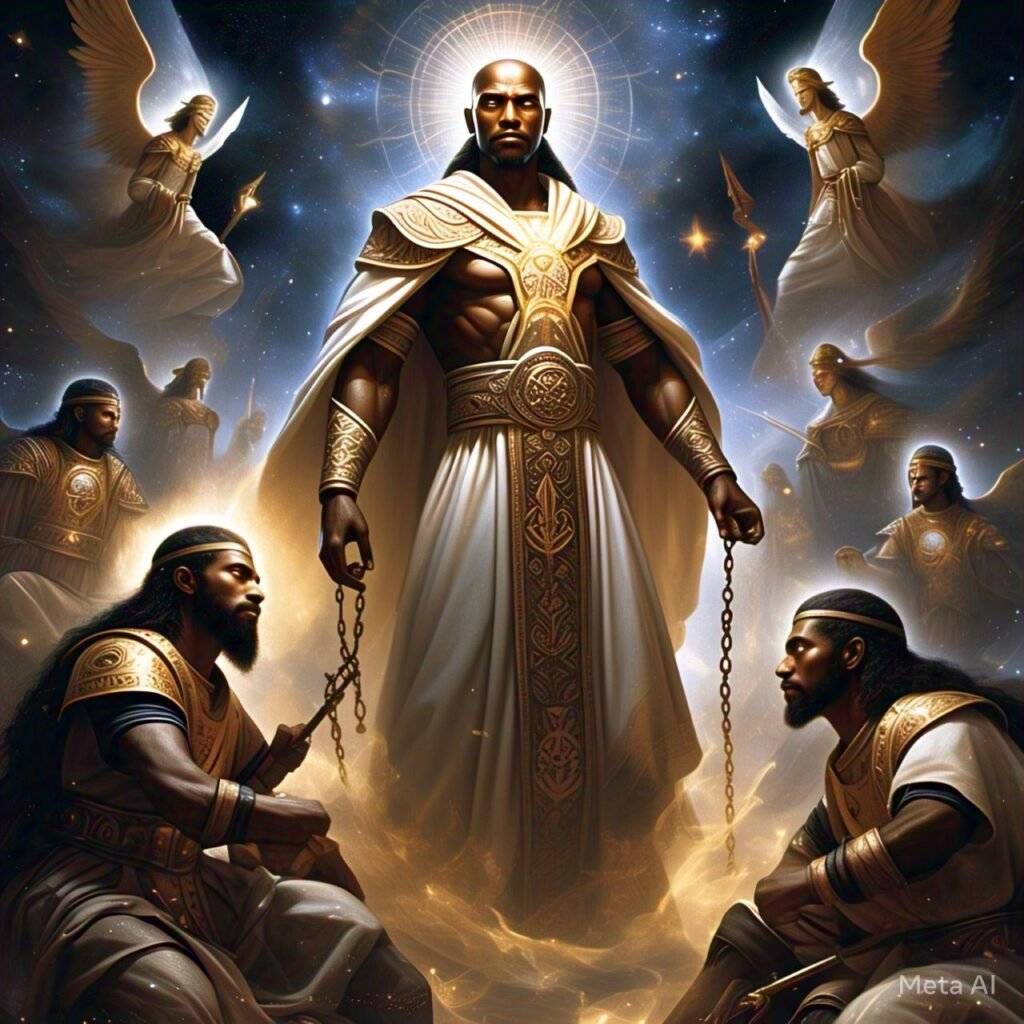
The “Son of Man” prophecy, which is heavily featured in the apocalyptic sections of the Book of Enoch, outlines the coming of a just ruler who will bring divine retribution to the wicked and restore righteousness. This messianic figure is often interpreted as a precursor to Christ in Christian theology, further solidifying Enoch’s role in both Jewish and Christian eschatological frameworks.
In the Jewish tradition, the coming of the Messiah is anticipated as the ultimate deliverance, when all nations will acknowledge the sovereignty of God, and peace will be restored to the world. Enoch’s prophecies point to a time when divine justice will be established in a way that mirrors the coming of a Messiah. The significance of Enoch’s prophetic role, in this light, underscores the continuity of the divine plan, where the eternal figure of Enoch remains a central part of God’s judgment and the ultimate restoration of the world order.
Enoch and the Legacy of Wisdom: The Perpetuation of His Teachings
Enoch’s immortality and his divine favor also point to the transmission of spiritual wisdom and the continuity of sacred knowledge across generations. His writings, particularly the “Books of Enoch,” offer an extensive exploration of divine principles, moral conduct, and the cosmic order. The teachings contained within these texts were intended not only for Enoch’s contemporaries but for future generations as well. This enduring legacy of wisdom is an essential aspect of Enoch’s immortality.
The transmission of knowledge, especially esoteric wisdom, is a crucial element in many spiritual traditions. Enoch’s immortality allows him to act as a timeless teacher, passing on the divine secrets that govern the universe to those who are willing to listen and learn. In some interpretations, his role as the divine scribe underscores the importance of recording spiritual truths for the benefit of humanity. The enduring nature of Enoch’s writings serves as a bridge between ancient wisdom and future generations, ensuring that sacred knowledge continues to influence the spiritual journey of those who seek enlightenment.
In the context of Jewish and Christian mysticism, the perpetuation of Enoch’s wisdom is particularly significant. His texts, which were preserved outside of the canonical scriptures, became important tools for understanding the divine plan and the nature of existence. Enoch’s influence is thus seen as a crucial element in the unfolding of spiritual history. His writings, steeped in mystical teachings, helped shape not only the apocalyptic visions of the future but also the understanding of humanity’s relationship with God.
Enoch and the Hidden Realms of the Universe: A Guardian of Cosmic Knowledge
Enoch’s immortality and his ascension into the heavenly realms are not simply symbolic of spiritual enlightenment—they also position him as a guardian of cosmic knowledge, a being who stands at the threshold between the earthly realm and the divine. The notion of hidden realms—both celestial and subterranean—has played a prominent role in many ancient mythologies, and Enoch’s ascension into heaven places him in a position to oversee these realms.
In the Book of Enoch, there is a detailed exploration of the heavenly realm and the various orders of angels and spiritual beings that inhabit it. These realms are not only places of divine presence but also stores of hidden knowledge and wisdom. Enoch’s journey to the highest heavens gives him access to these divine mysteries, placing him in a unique position to act as a mediator between the hidden realms and the earthly realm.
Enoch’s immortality, in this context, can be seen as a reflection of his role as a guardian of cosmic secrets. His knowledge of the divine and the workings of the universe is not just abstract or theoretical—it is deeply practical, offering insights into the nature of life, death, and the forces that govern existence. This cosmic knowledge is presented as a key to understanding the mysteries of the universe and the ultimate purpose of life. As an immortal being who resides at the threshold of both worlds, Enoch serves as the conduit for this wisdom, ensuring that humanity has access to the hidden knowledge that can lead to spiritual enlightenment and redemption.
Enoch and the Link Between Humanity and the Divine
One of the most profound aspects of Enoch’s immortality is his role as a link between humanity and the divine. Enoch, as a human who was taken into heaven without experiencing death, represents the potential for humans to transcend their earthly limitations and attain divine favor. This connection between the human and divine is a recurring theme in many religious and mystical traditions, where certain individuals are believed to have been chosen to embody the perfect union of the two realms.

In the case of Enoch, his ascension signifies that humanity is capable of reaching heights of spiritual perfection that are traditionally reserved for divine beings. His immortality challenges the notion that human beings are inherently limited by their mortality. Instead, Enoch’s story offers the possibility that, through divine favor, human beings can achieve a state of eternal life and spiritual fulfillment that is typically associated with the divine.
This idea is further supported by the way Enoch’s transformation into Metatron positions him as both a divine being and a former human. As Metatron, Enoch retains his identity as a human being while simultaneously occupying the highest ranks of the heavenly hierarchy. This dual nature reinforces the idea that humans are not entirely separate from the divine but are capable of attaining divine qualities through righteousness, wisdom, and divine grace.
Enoch and the Reconciliation of the Spiritual and Physical Worlds
Enoch’s immortality also represents the reconciliation of the spiritual and physical worlds. His journey to heaven, while remaining physically intact, is symbolic of the integration of the material world with the spiritual. In many ancient traditions, the physical and spiritual realms were seen as separate and sometimes even opposing forces. The material world was often viewed as imperfect and transient, while the spiritual world was considered eternal and pure.
Enoch’s ascension, however, suggests a different view—that the two realms can coexist and even harmonize. His immortality, granted through divine intervention, signifies that the physical world is not inherently disconnected from the divine. Instead, it becomes a conduit through which spiritual transcendence can be achieved. This concept resonates with the idea found in many mystical teachings, where the ultimate goal is to bring the divine presence into the material world, allowing for a more profound connection between humanity and the cosmos.
Enoch’s immortality, therefore, becomes a symbol of this divine reconciliation, suggesting that humanity’s physical existence is not a barrier to spiritual enlightenment but rather an integral part of the divine plan. This view challenges traditional dualistic notions and offers a more holistic understanding of the relationship between the earthly and the heavenly realms.
Conclusion: The Eternal Legacy of Enoch and the Secrets of Immortality
Enoch’s story is one of transcendence, divine favor, and the uncharted territories of spiritual wisdom. As the first immortal man, his journey from mortal to eternal has sparked endless fascination and exploration across cultures, religious traditions, and mysticism. Through his ascension, transformation, and role as a divine mediator, Enoch became a timeless symbol of humanity’s potential for spiritual evolution and divine connection.
The secrets behind human longevity and immortality, as illuminated by Enoch’s example, are deeply intertwined with themes of righteousness, divine grace, and the pursuit of knowledge. Enoch’s immortality wasn’t just a physical gift; it represented the potential for eternal wisdom, a bridge between the human and the divine realms, and a model of how human beings can strive for higher purposes and spiritual fulfillment.

Moreover, Enoch’s legacy continues to be relevant in the context of modern interpretations of spirituality. His writings and prophecies remind us that humanity is not bound by its earthly limitations. Instead, there is an ongoing invitation to transcend material concerns, seek divine wisdom, and align with higher cosmic truths that lead to fulfillment, peace, and, ultimately, immortality—whether in a spiritual sense or through the enduring impact of one’s actions and teachings.
In this eternal journey, Enoch’s figure serves as both a mystery and a guide. As humanity continues its search for meaning, longevity, and understanding of the cosmos, the story of Enoch remains a powerful testament to the enduring power of faith, wisdom, and divine potential. The secrets he uncovered and the path he walked resonate across generations, inspiring a deeper exploration of the mysteries of life and the possibility of eternal transformation.
Latest Updates

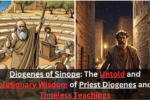
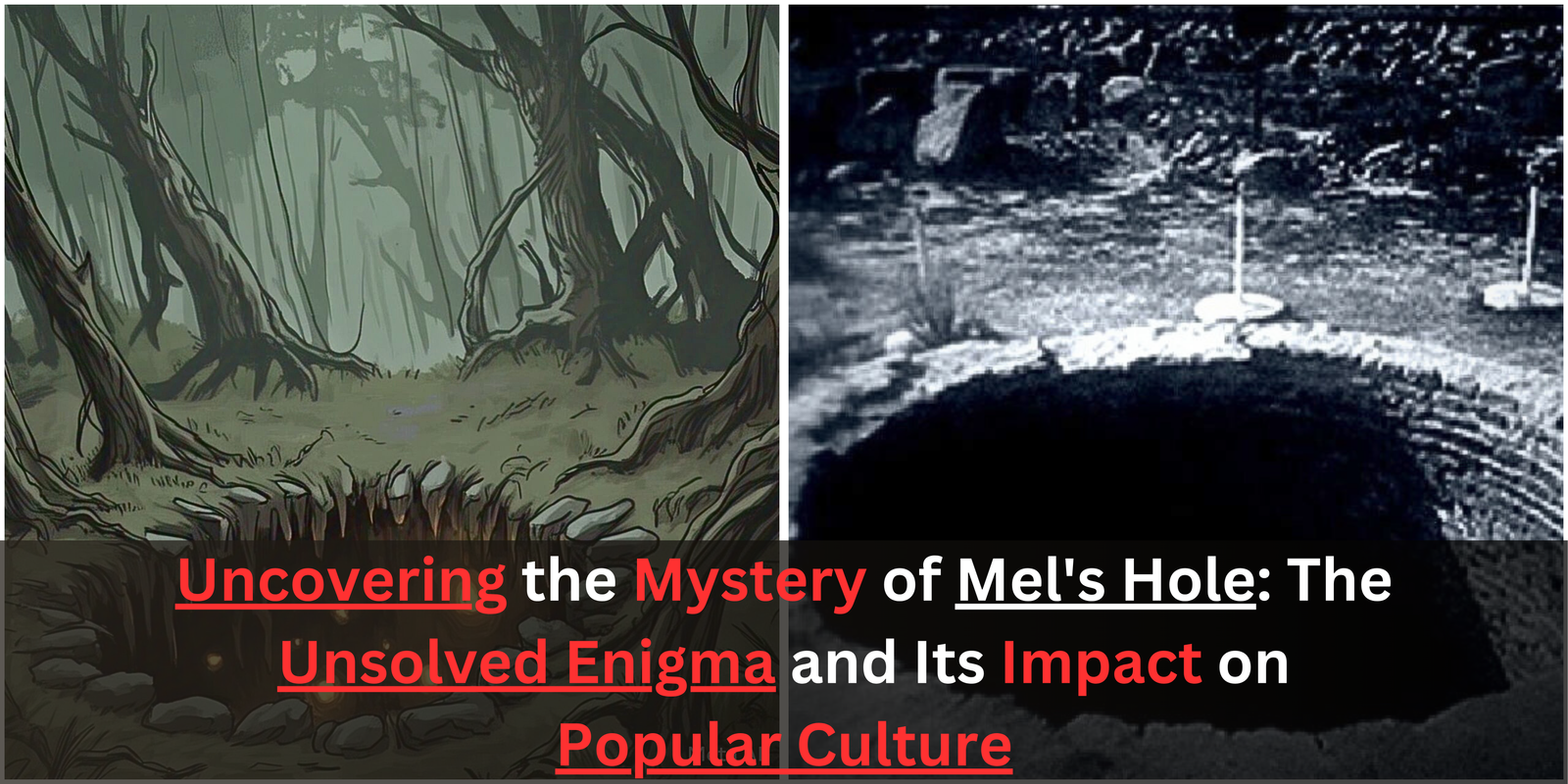

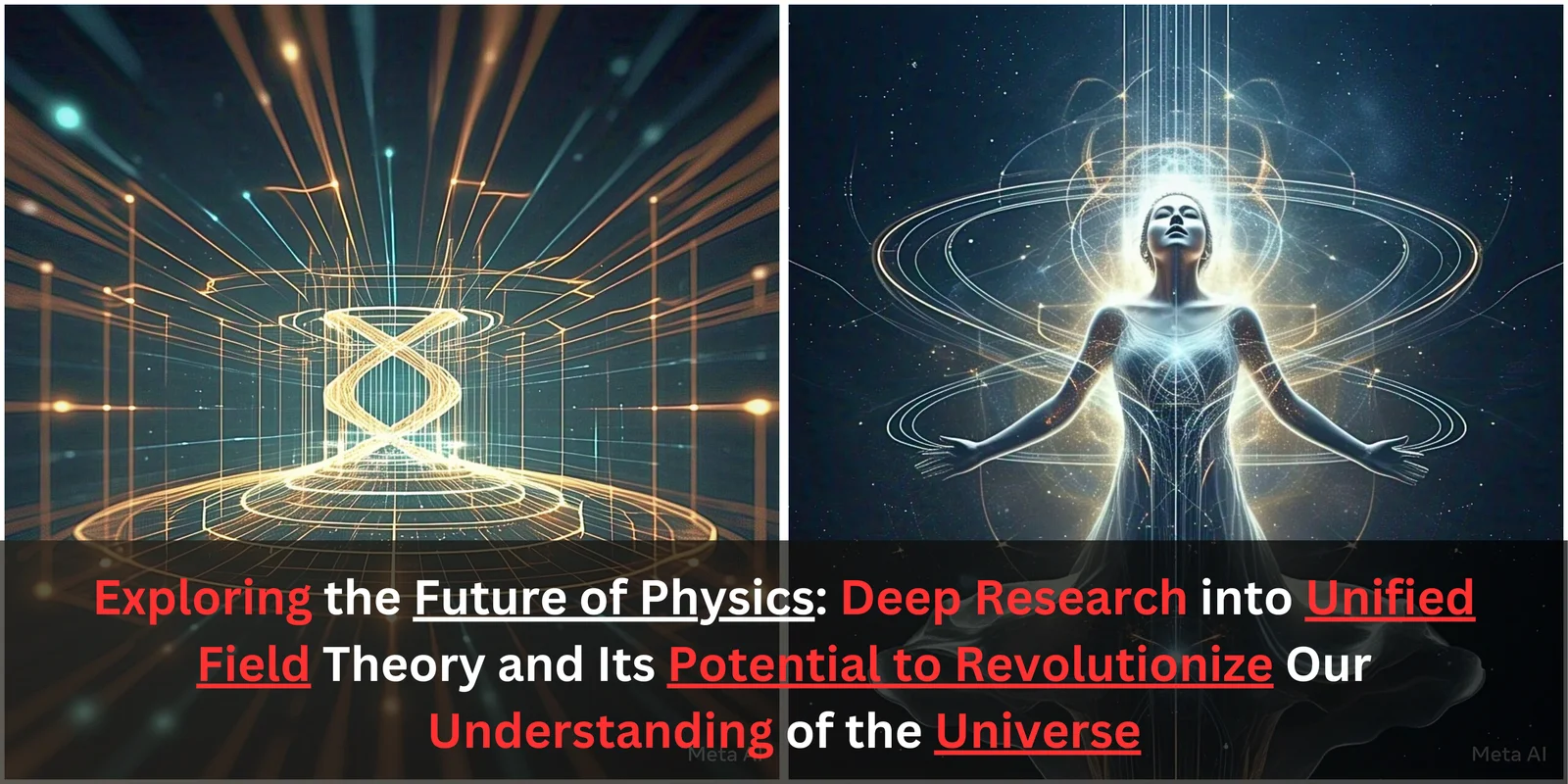


 Let’s imagine, explore, and uncover the mysteries together!
Let’s imagine, explore, and uncover the mysteries together!